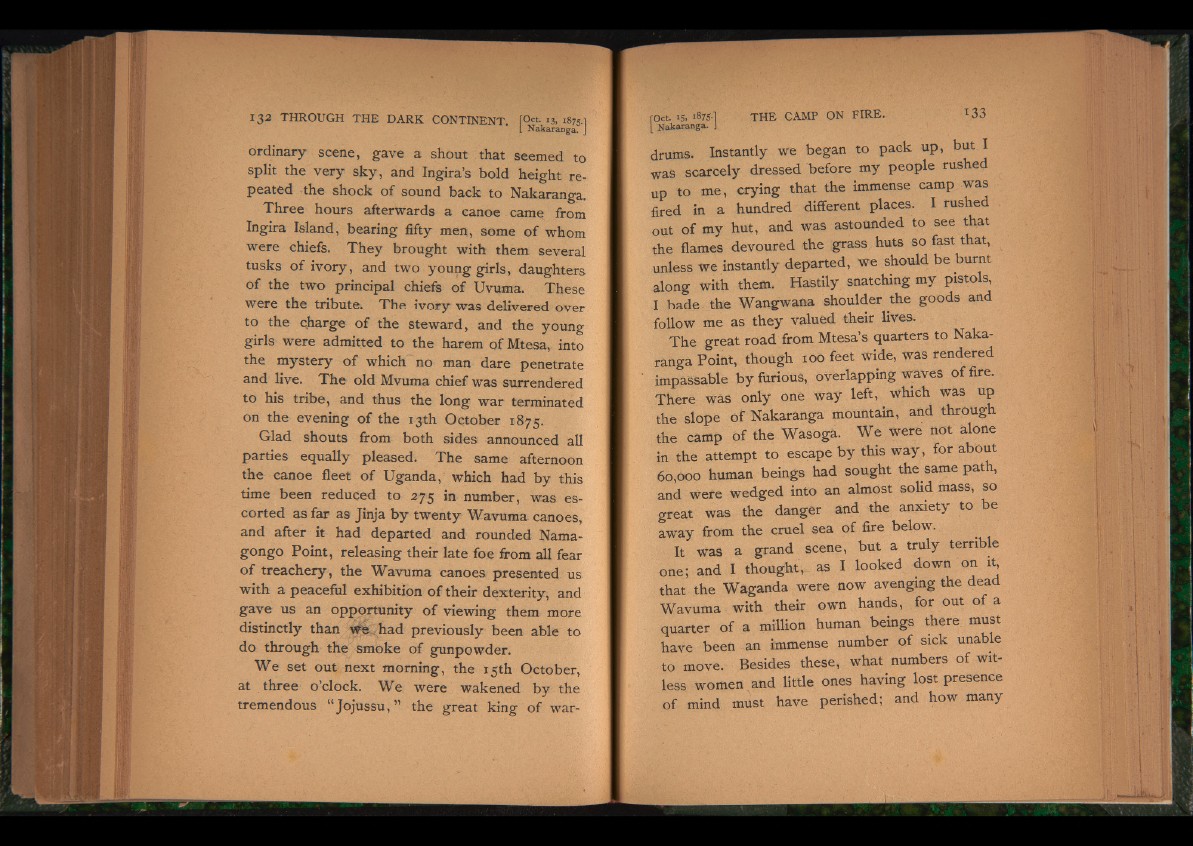
ordinary scene, gave a shout that seemed to
split the v e ry s k y , and Ingira’s bold height repeated
the shock o f sound back to Nakaranga.
Three hours afterwards a canoe came from
Ingira Island, bearing fifty men, some o f whom
were chiefs. T h e y brought with them several
tusks o f ivo ry , and two young girls, daughters
o f the two principal chiefs o f Uvuma. These
were the tribute, The ivo ry was delivered over
to the charge o f the steward, and the young
girls were admitted to the harem o f Mtesa,. into
the mystery o f which no man dare penetrate
and live. T h e old Mvuma chief was surrendered
to his tribe, and thus the long war terminated
on the evening o f the 13th October 1875.
Glad shouts from both sides announced all
parties equally pleased. The same afternoon
the canoe fleet o f Uganda, which had b y this
time been reduced to 275 in number, was escorted
as far as Jinja b y twenty Wavuma canoes,
and after it had departed and rounded Nama-
gongo Point, releasing their late foe from all fear
o f treachery , the Wavuma canoes presented us
with a peaceful exhibition o f their dexterity, and
ga ve us an opportunity o f viewing them more
distinctly than we., had previously been able to
do through the smoke o f gunpowder.
W e set out next morning, the 15th October,
at three o’clock. W e were wakened b y the
tremendous “ Jojussu,” the great king o f wardrums.
Instantly we began to pack up, but I
was scarcely dressed before my people rushed
up to me, crying that the immense camp was
fired in a hundred different places. I rushed
out o f my hut, and was astounded to see that
the flames devoured the grass huts so fast that,
unless we instantly departed, we should be burnt
along with them. Hastily snatching my pistols,
I bade the Wangwana shoulder the goods and
follow me as th ey valued their lives.
T he great road from Mtesa’s quarters to Nakaranga
Point, though 100 feet wide, was rendered
impassable b y furious, overlapping waves o f fire.
There was only one w a y left, which was up
the slope o f Nakaranga mountain, and through
the camp o f the Wasoga. W e were not alone
in the attempt to escape b y this w a y , for about
60,000 human beings had sought the same path,
and were wedged into an almost solid mass, so
great was the danger and the anxiety to be
away from the cruel sea o f fire below.
It was a grand scene, but a truly terrible
one; and I thought, as I looked down on it,
that the Waganda were now avenging the dead
Wavuma with their own hands, for out o f a
quarter o f a million human beings there must
have been an immense number o f sick unable
to move. Besides these, what numbers o f witless
women and little ones having lost presence
o f mind must have perished; and how many